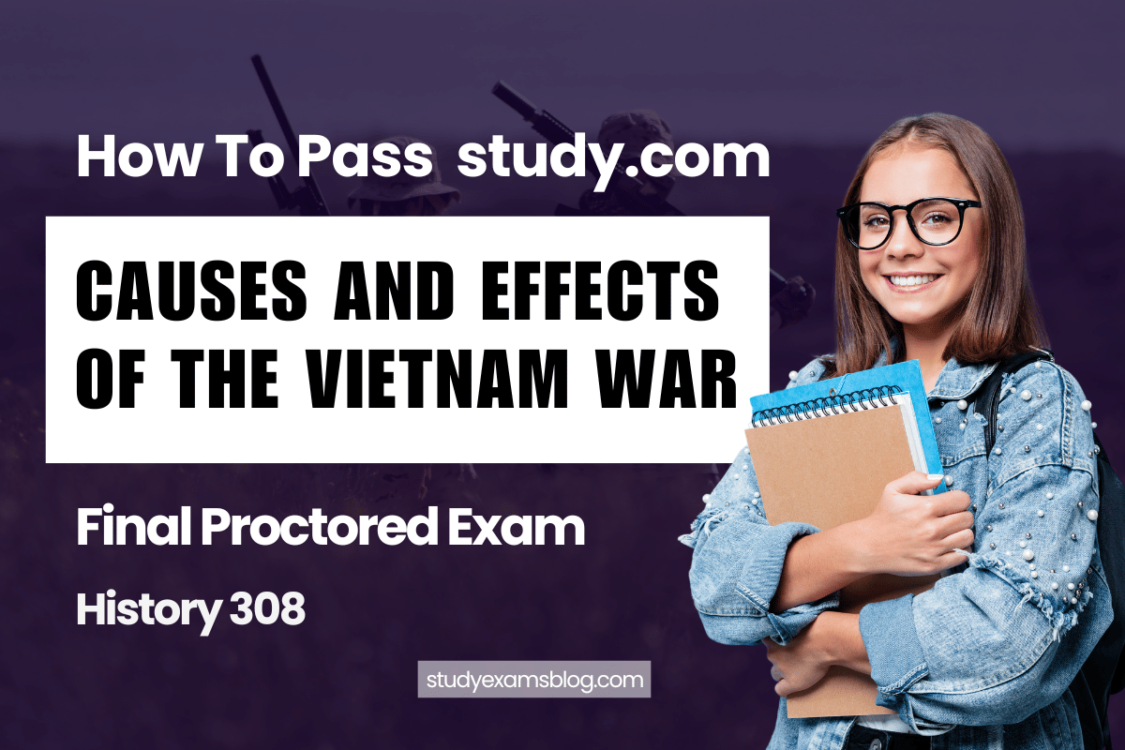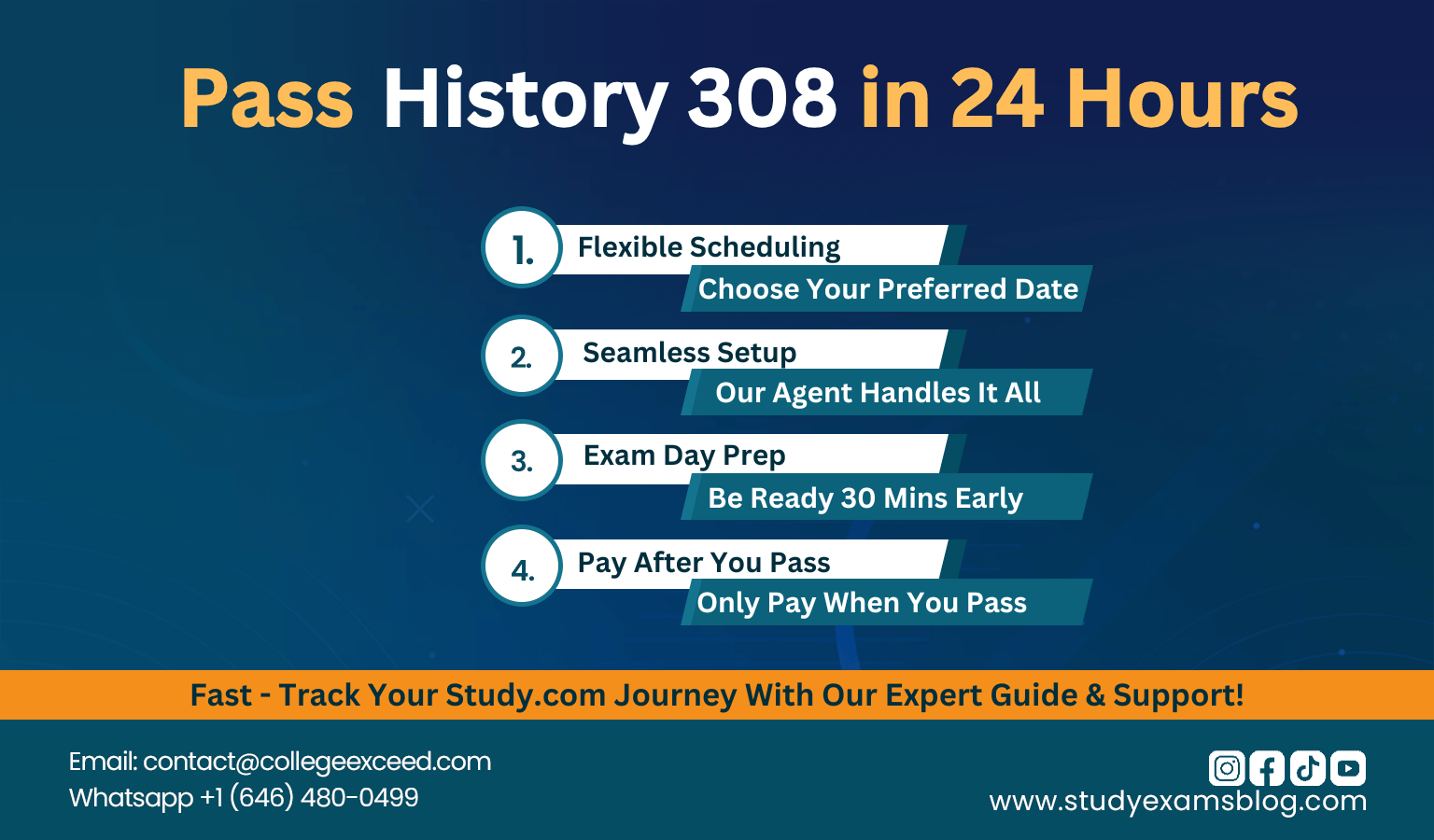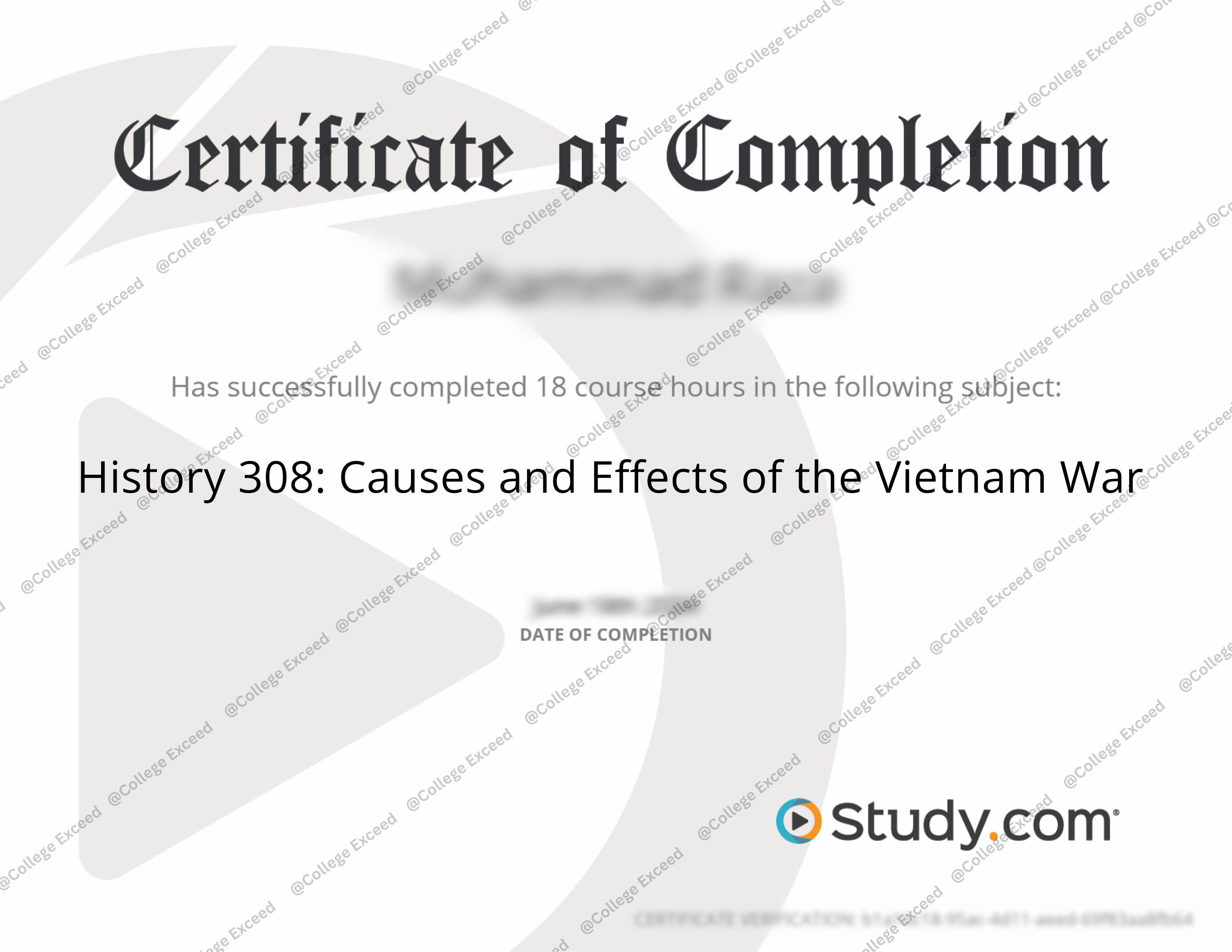
-
Gavin Walton
- October 22, 2024
If you are preparing for study.com History 308: Causes and Effects of the Vietnam War, you are about to undertake one of the most significant events in the 20th Century. From the rise of Vietnamese nationalism to the interplay between the major powers of the world such as the U. S, China, and the Soviet Union this course has it all. And do not worry—it’s not ONLY thick and heavy historical speculations. As organized in this course, you will learn more about the effects of these wars on global and personal spheres, as well as the processes of how key political events can result in unforeseen outcomes. Sounds exciting, right?
What’s even better? It becomes easy for you to follow through the course from beginning to end, and whoever requires a simple explanation of some of the complications involved in the history will find this course helpful. Regardless of whether you have a passing interest in history at all or whether this war was something that happened before your time, by the time you are done with this course, you should be fully equipped with as much knowledge as is humanly possible as to why the Vietnam War was such a game changer in terms of global politics and for American society and the larger world in general. Are you ready to receive an ‘A’ in this class? Let’s get started!
---

What to Expect from Study.com History 308 Class 📖
To give you an overview of what is expected from you in this course, let us discuss some of the key areas of focus. Study.com History 308 makes you join a detailed study of the Vietnam War but not by directly beginning with the war itself.
Vietnamese nationalism begins here where you will find about how colonialism and particularly French rule had instilled the spirit of rebellion. Then you will switch to the First Indochina War, to consider the French striving to hang on and the rise of figures such as Ho Chi Minh. Honestly, these will be seen throughout the quizzes and the final exam, so do remember them!
The course also provides detailed coverage of American involvement, and the key historical foreign policy decisions of Roosevelt, Truman, and Eisenhower. You will reconstruct the process of the U. S’s becoming involved in Vietnam and the bigger-scale war and aggression. These are special events that you should not miss such as the Geneva Conference and the sad event that took place- the Gulf of Tonkin Incident. Details of these events may well be challenged notably in relation to changes in U.S. policies during the war.
Last but not least; the effect of the Vietnam War is then discussed at the end of the course. Such is the case of the fall of Saigon, the effects on the veterans, and the creation of the Vietnam Syndrome of Americans’ war aversion. The consequences, especially in Southeast Asia and the US, which you have to memorize to ace your finals, are long-lasting. They are not only useful if one is to understand the past, but these broader impacts are relevant in today’s society, which makes it even more fun and interesting to look into!
Week-by-Week Study Plan to Ace Study.com History 308 Exam📝
In order to cope with this course and be prepared for the final examination it is necessary to follow a proper studying timetable. Here’s a week-by-week breakdown to keep you on track and ensure you’re prepared for the big day:
Week 1: Introduction and Vietnamese Nationalism
- Watch Lessons 1-4 on understanding history and primary sources.
- Dive into the first chapter on Vietnamese Nationalism. Focus on understanding Ho Chi Minh’s rise to power and the role of French colonization.
- Quizlet resource: Vietnamese Nationalism Flashcards
- Bonus YouTube video: Vietnamese Nationalism Explained
- Key goal: Identify how nationalism shaped Vietnam’s quest for independence.
Week 2: The First Indochina War
- Watch lessons that cover the First Indochina War. Pay close attention to the Geneva Conference and the importance of the Battle of Dien Bien Phu.
- Revisit key figures like General Vo Nguyen Giap and learn about French leadership tactics.
- YouTube resource: Battle of Dien Bien Phu Documentary
- Key goal: Understand why the First Indochina War was pivotal for Vietnam’s independence.
Week 3: U.S. Involvement in Vietnam
- Start learning how the U. S became a party to the Vietnam conflict as early as Roosevelt’s period of foreign policy.
- View lectures on Truman and his anti-communist position as well as the domino theory which formed the basis of the intervention.
- Review the Geneva Accords and Eisenhower’s decisions during the early stages of American involvement.
- Extra reading: The Domino Theory Explained
- Key goal: Grasp the significance of early U.S. involvement and how it shaped the conflict.
Week 4: Battles & Operations
- I wish I could say it is a calm week but how!! Take time to explain key battles and operations which include; Operation Rolling Thunder, Tet Offensive, and others.
- This question may quite probably be tested, be sure to focus on the knowledge of the Gulf of Tonkin Incident.
- Quizlet resource: Vietnam War Battles Flashcards
- Key goal: Try to memorize the names of the major battles in the war and the effects of each of them.
Week 5: Opposition to the War & U.S. Strategies
- Find out about the domestic protest against the Vietnam War. Anti-war protests, the media, and prominent personalities such as Martin Luther King Jr. and Robert Kennedy.
- Refresh the reader with Johnson’s approaches to military operations and the transformations that occurred during this period.
- YouTube resource: The Anti-Vietnam War Movement
- Key goal: Understand the growing domestic dissent and its effect on U.S. policy.
Week 6: Cambodia, Laos, and the Aftermath of the War
- Find out how the Vietnam War impacted Cambodia and Laos.
- Discuss the acceptable use of force and the ending of the Vietnam War with consideration of the Paris Peace Accords and the fall of Saigon.
- Examine the legacy of the war on Vietnam & the U. S.: Vietnam syndrome & treatment of veterans.
- Bonus reading: Vietnam Syndrome and U.S. Foreign Policy
- Key goal: Make the Vietnam War relevant to the current U. S. foreign policy and people’s perception.
Week 7: Review & Prepare for the Final Exam
- Revisit key lessons and take practice quizzes on study.com.
- Try making flashcards for issues you are not very familiar with, and approximately ensure yourself all topics you are not very confident about.
- Study.com Practice Test: It is advisable to be well prepared by undertaking a full-length practice test to determine how well you understand the material.
- Key goal: Check out for any gaps in knowledge that you may have and consolidate whatever may be remaining before you sit for your final test.
Follow this plan, and you’ll be in great shape to pass Study.com History 308: Causes and Effects of the Vietnam War with flying colors!
---
Top Free Resources to Deepen Your Understanding of Vietnam War Causes📂
1. YouTube Channels/Playlists
- CrashCourse: U.S. History – Vietnam War
CrashCourse Vietnam War Playlist
The Vietnam War playlist by Crashcourse is fast and fun, so this is a perfect playlist for people who don’t know much about it. They have so many resources in a single place: maps, organized chronologically to describe battles or political climate over the involvement of the U.S., etc. - Hindsight: Vietnam War Explained
Hindsight Vietnam War Videos
Hindsight offers documentary-style videos with deep dives into key events like the Gulf of Tonkin Incident and the Tet Offensive. Great for supplementing your lessons!
2. Quizlet Flashcards
- Vietnamese Nationalism Flashcards
Quizlet: Vietnamese Nationalism
These flashcards are perfect for reviewing key terms and concepts from the early stages of Vietnamese independence. - Vietnam War Battles Flashcards
Quizlet: Vietnam War Battles
Use these to memorize details of major battles like the Battle of Dien Bien Phu and Operation Rolling Thunder. Super useful for quick reviews before quizzes or the final exam.
3. Articles & Reading Resources
- History.com – Vietnam War
History.com Vietnam War Section
A go-to resource for detailed articles about every aspect of the war, from the U.S.’s involvement to key figures like Ho Chi Minh and Ngo Dinh Diem. - PBS Vietnam War Resources
PBS Vietnam War Documentary
If you’re looking for deeper context, PBS’s series and resources provide a wealth of information. The documentaries are especially helpful for understanding the long-term effects of the war.
4. Study Guides & Flashcards
- StudyStack: Vietnam War
StudyStack Vietnam War Flashcards
Another excellent source for quick reviews. These flashcards cover everything from the First Indochina War to the Paris Peace Accords. - Khan Academy: U.S. History – The Vietnam War
Khan Academy Vietnam War Lessons
Khan Academy offers detailed lessons on U.S. involvement in Vietnam, including timelines and analysis that complement your study.com lessons.
---
Important Political and Military Factors to Focus On🔑
Before we go on, it will be good to revisit some of the most important ideas that are central to study.com History 308. These topics will not only assist in answering all the quizzes and the final exam but will also provide knowledge of the Root Causes and Consequences of the Vietnam War.
- The Domino Theory vs. Containment Policy
The U. S. became involved in the Vietnam War mainly due to the Domino Theory which states that if one country in Southeast Asia collapsed, others would follow like the dominoes. This led to the formation of policies of containment to ensure that communism did not expand its territory any further. The relations between these two concepts need to be characterized in order to fully comprehend the actions of the U.S. in the course of the war.
Domino Theory | Containment Policy |
|---|---|
The belief is that the fall of one country to communism will trigger the fall of neighboring countries. | A strategy to prevent the expansion of communism beyond its current borders. |
Applied heavily to Southeast Asia during the Cold War era. | First established with the Truman Doctrine to counter Soviet influence globally. |
This led to U.S. intervention in Vietnam. | Enforced through military and political strategies, such as aiding South Vietnam. |
- The Geneva Accords and Its Impact
Vietnam was divided at the 17th parallel in to divided administered by Ho Chi Minh in the North and Ngo Dinh Diem in the South by the Geneva Accords of 1954. Expanded to have this purpose it seemed like a viable solution albeit for the short term, the ausure of not conducting elections in 1956 paved the way for the Vietnam War. These accords can become significant very often, so let’s remember about them!
North Vietnam | South Vietnam |
|---|---|
Led by Ho Chi Minh and supported by the Soviet Union and China. | Led by Ngo Dinh Diem, backed by the U.S. |
Wanted a unified, communist Vietnam. | Opposed communism, with the U.S. pushing for a non-communist government. |
Engaged in the People’s War to rally citizens in support of unification. | Rejected the 1956 elections, sparking further conflict. |
- Guerrilla Warfare vs. Conventional Warfare
It was also characterized by the difference in warfare styles of the Viet Cong and the PAVN on the one hand and the US on the other through the use of conventional force. The Viet Cong had ineffective strategy tactical plans and weapons whereas the U. S. had a lot of equipment and weapons but failed at being tactful.
Guerrilla Warfare (Viet Cong) | Conventional Warfare (U.S.) |
|---|---|
Small, mobile units using ambushes and surprise attacks. | Large-scale military operations, such as Operation Rolling Thunder. |
Knowledge of local geography gave them an advantage. | Heavy reliance on technology and air superiority. |
Effective in rural areas, where the Viet Cong had support. | Less effective in jungles, where the U.S. faced challenges in adapting. |
- The Tet Offensive and Its Political Impact
Thus the Tet Offensive of 1968 can be seen as a pivotal point in the Vietnam War. Even though it was a military loss for North Vietnam it was a positive result from the political point of view as it stunned the American people and changed the course of actions of the USA. Many people in the United States lost faith in the war after the Tet Offensive, which led to President Lyndon B. Johnson’s choice to not run for re-election campaign.
Military Outcome | Political Outcome |
|---|---|
North Vietnam suffered heavy losses but managed to temporarily control several major cities. | American media coverage turned public opinion against the war. |
The U.S. quickly recaptured lost territories. | This led to growing anti-war sentiment and protests in the U.S. |
Demonstrated that North Vietnam could strike anywhere, anytime. | Marked a shift in U.S. strategy towards eventual withdrawal. |
These terms will be important in your perception of the Vietnam War. Make sure you review these areas, especially for your quizzes and the final examination for you to perform well in them.
---
Study.com History 308 FAQ❓
- What is important when doing the quizzes in this course?
After every lesson, make sure you review your notes and flashcards so that you do not forget the information. For every quiz you are provided with three tries, so don’t waste all of your tries on one difficult question!
- What’s the best way to remember all the different battles and operations?
Group the battles in chronological order and create a timeline for quick reference. Use flashcards and visual aids like YouTube videos to reinforce key points.
- What’s the hardest part of the final exam?
Understanding shifts in U.S. foreign policy during the war is often tricky. Focus on policies like the Domino Theory and Vietnamization for a solid grasp.
- How important are the primary sources in this course?
Primary sources provide real-time perspectives on key events. Pay attention to documents like Walter Cronkite’s editorial and the Gulf of Tonkin Resolution.
- What should I focus on for the final week of studying?
Review key concepts, take practice exams, and focus on areas where you feel less confident. Revisit flashcards and practice tests to reinforce your knowledge.
---
Concluding Insights on Mastering the Causes and Effects of the Vietnam War📄
Study.com History 308: Causes and Effects of the Vietnam War is a detailed course that takes learners through one of the most influential wars in the contemporary world. If you get to know the best pieces of advice on how to prepare for the final exam, you will not only remember all the material to be successful in the Vietnam War test but also understand the negative consequences of war to the present day. That is why by following the week-by-week study plan, using external resources, and paying extra attention to elements like U. S. foreign policy and major battles, you will be ready to face both quizzes and the proctored exam. To sum up, it’s crucial to recall that preparation is the cornerstone so always try to stay as well-prepared as possible, study often and do not forget about all the available resources and tools. Bye, everyone, take care and all the best to you, you are great and you can do it!



